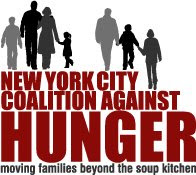 The Coalition released its report on its 2007 Annual Hunger Survey at City Hall the Tuesday before Thanksgiving, as well as at a series of events at food pantries and soup kitchens in all five boroughs. The City Hall event was in conjunction with leading New Yorkers - Council Speaker Christine Quinn, HRA Commissioner Robert Doar, NYC food policy coordinator Ben Thomases, Councilmembers Bill de Blasio, Eric Gioia, Annabel Palma , James Vacca, Letitia James, Jessica Lappin, and executive director of the New York City Coalition Against Hunger, Joel Berg.
The Coalition released its report on its 2007 Annual Hunger Survey at City Hall the Tuesday before Thanksgiving, as well as at a series of events at food pantries and soup kitchens in all five boroughs. The City Hall event was in conjunction with leading New Yorkers - Council Speaker Christine Quinn, HRA Commissioner Robert Doar, NYC food policy coordinator Ben Thomases, Councilmembers Bill de Blasio, Eric Gioia, Annabel Palma , James Vacca, Letitia James, Jessica Lappin, and executive director of the New York City Coalition Against Hunger, Joel Berg.Public Advocate Betsy Gotbaum, State Senator John Sabini, and Queens Councilmember Eric Gioia attended the Queens specific press event at East River Development Alliance/Center of Hope International Bread of Life Food Pantry. In Brooklyn, borough president, Marty Markowitz, attended the press event at Bed-Stuy Campaign Against Hunger food pantry.
The survey release was covered by the NYTimes, Metro NY, AM New York, NY Daily News, Times Ledger, NY1, News12 Bronx, WNYC, Bloomberg News, BBC World Service, and by over 35 foreign media outlets across the world, including Taiwan's The China Post, Slovakia's Bleskovky paper, Angola Press, and Brazil's Globo News - just to name a few. Here is a complete list.

